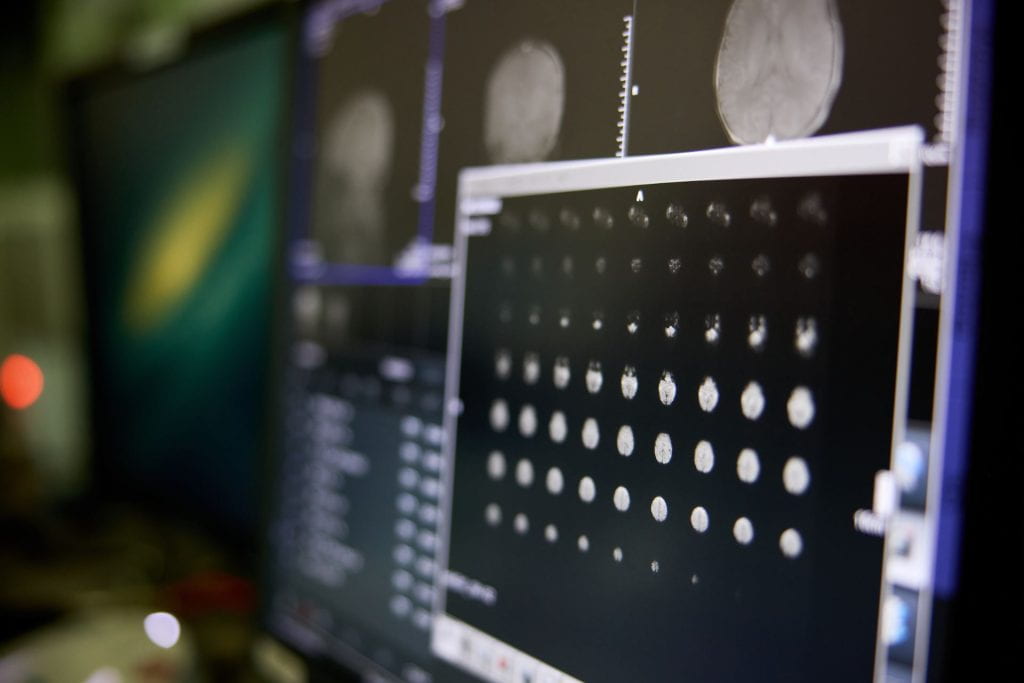It is no secret that healthcare has a massive impact on the environment. In fact, if global healthcare services were a country, they would amount to the fifth-largest emitter of greenhouse gases. As the effects of climate change on public health and infrastructure are increasing, the need for specialized sustainability practices within the healthcare sector are becoming apparent. Fortunately, more and more health care workers are learning how to initiate sustainable changes within their practices. At Washington University School of Medicine, Mallinckrodt Institute of Radiology (MIR) is implementing many sustainable changes, led by Dr. Benjamin Northrup, Assistant Professor of Radiology.
As radiologists routinely interact with colleagues across medical specialties, they are well positioned to be advocates for sustainable health care. Radiologists specialize in utilizing imaging technologies to accurately diagnose and treat medical conditions. While their use is vital to providing healthcare, these scanners do come with an environmental cost. Dr. Northrup states, “Over one year, the average CT [computed tomography] scanner uses as much energy as five four-person households, and the average MRI [magnetic resonance imaging] scanner uses nearly as much energy as 26 four-person households.” Overall, medical imaging is estimated to account for 1% of global GHG emissions.

An unexpectedly large proportion of these emissions occur when the scanners are in a non-productive idling state. The simple act of powering down scanners during non-operational times could save 40 – 80% of energy used annually. Dr. Northrup is working towards collecting energy use data of individual scanners at MIR, which will help identify key opportunities for energy reduction.
Picture archiving and communication systems (PACS), where medical images are stored, require the use of specialized computer workstations, creating another large source of GHG emissions. Turning off these workstations overnight and on weekends could reduce energy use equivalent to the annual emissions from ten passenger vehicles.
While those numbers are scary, Dr. Northrup believes in the power of the collective action of radiologists to push for more efficient equipment. “As a major purchaser of scanners – not only in terms of volume, but their newest and best models – our center could have a huge impact on the features of these scanners. We could potentially collaborate with these vendors to produce new scanners that are more energy efficient.”
Dr. Northup is also leading the charge in reducing waste associated with medical imaging. Radiologists use iodinated contrast to enhance visibility of vascular structures and to facilitate image-guided procedures; it is essential to diagnostic and interventional procedures. Unfortunately, iodine is a nonrenewable resource, with a growing body of evidence supporting the negative environmental effects of iodinated contrast media. To combat this, MIR implemented a contrast recycling program through GE Healthcare in March 2023. There are iodinated contrast recycling stations at MIR, as well as at three MIR-associated sites (Barnes-Jewish West County Hospital, The Washington University and Barnes-Jewish Orthopedic Center in Chesterfield, and The Center for Advanced Medicine – South County), with detailed instructional signage to assist with education on the recycling process. Through this program, the Radiology department has avoided more than 220 liters of contrast waste to date, resulting in 55 kg of iodine recycled, all at no cost to the institution.
Through these initiatives, Dr. Northrup is leaving a sustainable legacy within the radiology department at WashU.
Further Reading
Greening radiology – PubMed (nih.gov)
Radiology in Our Changing Climate: A Call to Action – PubMed (nih.gov)
Climate Change and Radiology: Impetus for Change and a Toolkit for Action (rsna.org)
Do you have a sustainability story from your corner of the university? We want to hear about it! Reach out to us at sustainability@wustl.edu.
